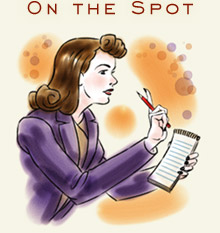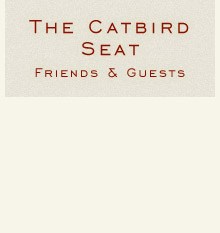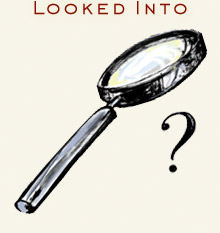Emdashes—Modern Times Between the Lines
The Basics:
About Emdashes | Email us
Ask the Librarians
Best of Emdashes: Hit Parade
A Web Comic: The Wavy Rule
Features & Columns:
Headline Shooter
On the Spot
Looked Into
Sempé Fi: Cover Art
Michael Shannon and Daniel Kitson: Simply Awesome
Filed under: On the Spot Tagged: 92Y, Craig Wright, Daniel Kitson, Ethan Coen, John Leguizamo, Michael Shannon, Steve Martin, UCBT, Whiplash

Martin Schneider writes:
Look to this space every Wednesday for my thoughts on politics and/or events. Early 2011 is a relatively unengaging time for a diehard Democrat, what with the White House occupied by one of our own and recent Republican victories, but that will change in the near future. So I'll be writing more about events for the time being, I suspect.
By events I mainly mean plays, author events, rock concerts, and standup comedy gigs.
January has been busy. I saw an absolutely spectacular production of Craig Wright's play Mistakes Were Made at the Barrow Street Theater. The flabbergastingly good Michael Shannon, familiar from Revolutionary Road and Boardwalk Empire and a longtime favorite of mine, gives one (continued)
Comic Sans Is Good, Caps Lock Is Bad, Judd Apatow Continues to Make Progress
Filed under: Headline Shooter Tagged: Bonnie Downing, capitalization, don't worry David Denby I am not writing about you, Jon Lackman, Judd Apatow, language, Laura Miller, Leila Cohan-Miccio, movies, punctuation, Salon, Seth Rogen, Slate, Splitsider, Tea Party, The Hairpin

Emily Gordon writes:
A sausage chain of inky links:
Friend Laura Miller wrote about this at (on? for? I tried all three, and this has been driving me crazy for years, but I’m going to stick with “at,” I guess) Salon: Hideous fonts may boost reading comprehension.
At Slate, Jon Lackman asks the overdue question, “Why do Tea Partiers uppercase so many of their nouns?” Is it anyone else’s observation, especially those, like me, who have taught college English, that a lot of Americans capitalize a lot of nouns? I wonder if English is using the people who do this as a psychic medium to contact its former incarnations. Lackman alludes to this: “In the century prior to 1765, nouns were generally capitalized. (The reason for this is now obscure; Benjamin Franklin hypothesized that earlier writers ‘imitated our Mother Tongue, the German.’)”
Leila Cohan-Miccio wrote this at Splitsider, the site in the invincible trio of already extremely funny sites that’s specifically about the field/world/pathology of comedy: “In Defense of Judd Apatow’s Female Characters,” which reminds me of the rousing (continued)
Two Oh One One Yippee-ki-yay
Filed under: Little Words Tagged: 2011, design, new leaves, obsessions, old loves
Late But Not Without Love: Our Punctuation Contest Winner!
Filed under: The Catbird Seat: Friends & Guests Tagged: books, contests, fiction, letters, Nicole Rushin, punctuation, What He's Poised to Do

Some time ago, we sponsored a contest—write a letter to a punctuation mark, and get a chance to win a signed copy of Ben Greenman’s book What He’s Poised to Do—whose results diverted and delighted us. They also distracted us, so much so that it’s taken us, collectively, quite a while to pick a winner. The Emdashes staff selected an absurdly long but heartfelt of finalists, and now Ben has picked his winner. Here is the glad announcement, and with it, our collective apology that we can be awfully slow. Punctuation makes us dizzy and loony. Sometimes blogging does, too. Thank you so much to all the clever writers and true punctuation lovers who entered the contest. And now: Ben Greenman! —Emily Gordon
To say that I agonized over this contest would be an understatement. I have spent weeks staring at these semifinalists, trying to decide how to elevate one and let the others fall away. Who should win? Who will win? When we started this competition months ago, we had no idea that so many people would write such passionate, funny, and insightful letters to pieces of punctuation. We should have guessed. The relationship between a reader and his or her punctuation starts early, and it doesn’t operate as a type of infatuation or opportunism, as the relationship between readers and words sometimes does. The love of (or love for) a piece of punctuation grows slowly, over time, until it is undeniable: a reader looks and wonders until there’s no option left but saying what is felt.
In the end, after weighing them all, I selected Letter #2, Nicole Rushin’s letter to the tilde, in part because she couldn’t remember its name (she’s flustered by love) and in part because she has perfectly identified the seam between passion and fashion. Ten years ago, no one cared about the tilde except for Spanish teachers. Ten years from now, it will have passed into oblivion again. But today, in the waning days of the strange http era, it is a kind of little king. The last four sentences of Nicole’s letter are especially poignant, and especially true. Congratulations to our winner and all our entrants.
—Ben Greenman
Nicole Rushin’s winning entry, for which she will receive a signed and personally punctuated copy of Ben’s book:
Dear ~,
I am embarrassed to say that I have forgotten your name. You came into my life one torrid night while talking to the abrupt, but helpful customer service rep from Blue Host. I remember it clearly. I hope this letter reaches you. Is it too forward to say how I love the way you look after my name? Please write back. I am sending this out in a bottle, posting it in the classified ads. We would could be so happy together, crashing the shores of our meaning against each other, forever. I know nothing about you, I don’t know what you do? Why do you exist? I just want to know you.
Nicole ~ (continued)

Emily Gordon writes:
While recovering from sickness recently, I watched some execrable movies on cable. I love movie-watching so much I rarely suffer in the process of seeing almost any movie, and I saw this one all the way through. But at about the halfway mark I started reading the Rotten Tomatoes reviews as I half-viewed the images and half-listened to the dialogue from my horizontal pillow-state. You can click on the link below to see what movie this was, but it’s not important, I think. What’s important is how grand Roger Ebert is to have written this:Why? I wanted to ask the filmmakers. Why? You have a terrific cast and the wit to start out well. Why surrender and sell out? Isn’t it a better bet, and even better for your careers, to make a whole movie that’s smart and funny, instead of showing off for 15 minutes and then descending into cynicism and stupidity? Why not make a movie you can show to the friends you admire, instead of to a test audience scraped from the bottom of the IQ barrel?Let every person sitting in a Hollywood meeting ask himself (or, less likely, herself) these questions, and then answer them! (continued)
Just In Case You'd Forgotten....
Filed under: On the Spot Tagged: 92Y, Andres Serrano, Deborah Solomon, Frank Stella, Shepard Fairey, Steve Martin

Martin Schneider writes:
The Colbert Report, always eager to seize on a smaller story it can imprint itself on, last night dedicated the entire episode to Steve Martin and the art world.
Colbert delivered a report on the 92Y affair that was close to the original reporting of events, which is to say a bit hard on the audience purportedly demanding to hear Martin discuss his movies, a characterization I have already debunked. Colbert also included footage of a Fox News report I had not seen before, in which the 92Y audience is described as "irate" (again, certainly not true).
Colbert's account, while inaccurate and unfair, was certainly very funny and about what one would expect the show to do—that's (continued)
Steve Martin and 92Y: Your One-Stop Shop
Filed under: On the Spot Tagged: 92nd Street Y, 92Y, Deborah Solomon, events, Steve Martin

Martin Schneider writes:
I've gotten a couple of requests to provide sources for the ongoing Steve Martin/92Y saga, which will be stale in a week—but useful today!
The New York Times story that started the ball rolling (Felicia R. Lee)
Steve Martin's first Twitter post on 92Y
Overwrought NPR blog post (Linda Holmes)
Useful and informative MetaFilter thread
Steve Martin Op-Ed, New York Times
Steve Martin appearance on Later on Sunday Morning, CBS
Other coverage: (continued)
Steve Martin Speaks Out On 92Y
Filed under: On the Spot Tagged: 92Y, Deborah Solomon, Rita Braver, Steve Martin

Martin Schneider writes:
Saturday's edition of the New York Times included an op-ed piece by Steve Martin ("The Art of Interruption") in which he addressed his attention-getting appearance at 92Y last Monday. (See my earlier posts on this event here and here.)
Additionally, the CBS morning program Sunday Morning featured an interview conducted by Rita Braver in which Steve Martin discussed the event.
For what it's worth, Martin's thoughts on this seem pretty reasonable to me. More to come in a future post. (continued)
More on Martin and Solomon and 92Y
Filed under: On the Spot Tagged: 92Y, Deborah Solomon, Joseph Beuys, Linda Holmes, NPR, Steve Martin

Martin Schneider writes:
Two days ago I posted an account of the inadequate 92Y event of November 29 featuring Steve Martin and Deborah Solomon. Since then, the event has astonishingly spun off into a counter-narrative in which Martin and Solomon are the good guys and 92Y and the 92Y audience the villains.
The premise of this counter-narrative is that Solomon and Martin were off having a high-minded discussion about art, but the 92Y audience, and the 92Y itself, would not be appeased until Solomon prodded Martin into spinning some anecdotes about the filming of The Jerk or It's Complicated.
This counter-narrative is absurd, incorrect, and pernicious. I was there, and in the words to follow, I intend to set the record straight.
Three things happened to bring about (continued)
Here But Not Here--and Soon to Be Here Again
Filed under: Little Words Tagged: ch-ch-ch-changes, Chicago, love, productivity, The Happiness Project
Emily Gordon writes:
We’ve (or, more properly, I’ve!) been posting fairly infrequently lately, but we wanted to let you know that after months of regrouping, regrouponing, and a productive amount of internal tumult, we’re planning to start posting regularly again soon. Keep those cards and letters coming and see you soon! (continued)













